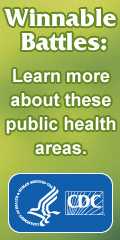Preventive Health Screenings
Did You Know? is a weekly feature from the Office for State, Tribal, Local and Territorial Support to inform your prevention activities. We invite you to read, share, and take action!
View the Current Did You Know?
October 28, 2016
- People are living longer and better with diabetes, but that means they can have diabetes-related health complications longer, too.
- Controlling blood sugar levels can help prevent or delay complications, and early detection and treatment of complications can keep them from getting worse.
- Healthcare and public health professionals can support patients by sharing this collection of articles created for people at risk for or living with diabetes.
November 13, 2015
- Everyone 6 months or older, with rare exceptions, should get a flu vaccine annually.
- Flu causes millions of illnesses, hundreds of thousands of hospitalizations, and thousands of deaths every year.
- Insurance can cover the cost of preventive services like the flu vaccine. Eligible consumers can enroll in a 2016 Marketplace plan through January 31.
November 8, 2013
- Colorectal cancer screening tests save lives by finding precancerous polyps and colorectal cancer early, when treatment works best. Screening is recommended for men and women aged 50–75 years.
- Several types of tests are used to screen for colorectal cancer. Ask your doctor [PDF-178KB] which test is right for you.
- The 25 states and 4 tribes in CDC's Colorectal Cancer Control Program provide screening services to underinsured low-income men and women aged 50–64 years.
April 26, 2013
- Although most Americans who have vision problems are aged 65 years or older, even preschoolers may not see as well as they should.
- A comprehensive dilated eye exam is the only way to detect eye problems early.
- Free resources are available to help educate your community about the importance of dilated eye exams.
November 16, 2012
- Black women are 40% more likely to die of breast cancer than other women.
- Implementing effective interventions, such as promoting timely follow-up after abnormal mammograms, using patient navigators, and providing high quality treatment, can help reduce breast cancer deaths.
- CDC's National Breast and Cervical Cancer Early Detection Program provides low-income, uninsured, and underinsured women access to timely breast and cervical cancer screening and diagnostic services.
September 28, 2012
- Glaucoma, the “sneak thief of sight,” affects more than two million US adults aged 40 or older and is projected to affect 3.3 million people by 2020.
- Early detection and treatment of glaucoma can help prevent blindness.
- You can promote sight-saving measures by encouraging comprehensive dilated eye exams
August 3, 2012
- About 61 million US adults are at high risk for serious vision loss, but only half visited an eye doctor in the past 12 months.
- Increased availability and affordability of eye health care services can help prevent blindness and vision impairment.
- Sharing these eye health tips can help the public take steps to keep their eyes healthy.
July 8, 2011
- Sixty-five percent of adults between the ages of 50 and 75 were screened for colorectal cancer in 2010.
- We can prevent an additional 1,000 colorectal cancer deaths each year by meeting the Healthy People 2020 target of 70.5% for colorectal cancer screening in the United States.
- Implementation of system-level evidence-based interventions can increase colorectal cancer screening rates.
May 27, 2011
- An estimated 11 million Americans who are visually impaired could achieve good vision with glasses, contact lenses, or eye surgery.
- Older adults with moderate or extreme vision loss are no more likely than those with good vision to get eye examinations.
- You can use the BRFSS vision module to measure vision health in your state.
March 18, 2011
- Of cancers affecting both men and women, colorectal cancer is the second leading cause of cancer death in the United States.
- If everyone 50 years and older were screened for colorectal cancer as recommended, up to 60% of deaths from colorectal cancer could be prevented.
- The Guide to Community Preventive Services finds that evidenced-based practices, such as client reminder systems, can improve colorectal cancer screening rates.
March 11, 2011
- Diabetes is the leading cause of kidney failure; it accounted for 44% of all new cases in 2008.
- The Diabetes Risk Test is available for your website to highlight American Diabetes Alert Day (March 22).
- The Guide to Community Preventive Services recommends a disease management approach to treat people with diabetes.
Did You Know? information and web links are current as of their publication date. They may become outdated over time.
- Page last reviewed: November 13, 2015
- Page last updated: October 28, 2016
- Content source:



 ShareCompartir
ShareCompartir



